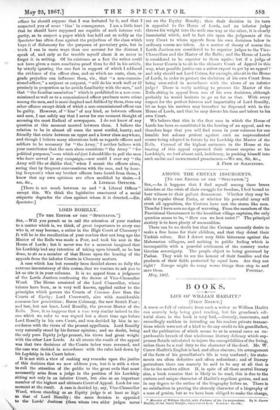LORD ROM1T,T,T [To TIM EDITOR OF THE "SPECTATOR."]
SIR, —Will you permit us to call the attention of your readers to a matter which is, we think, of great importance to every one who is, or may become, a suitor in the High Court of Chancery ? It will be in the recollection of your readers that not long ago the Master of the Rolls was made a Peer, and took his seat in the House of Lords ; but it never was for a moment imagined that his Lordship had any intention of taking upon himself, as be has done, to sit as a member of that House upon the hearing of the appeals from the inferior Courts in Chancery matters.
A case which has but recently been decided shows so fully the extreme inconsistency of this course, that we venture to ask you to let us cite it in your columns. It is an appeal from a judgment of the Lords Justices confirming the decree of Vice-Chancellor Wood. The House consisted of the Lord Chancellor, whose talents have been, as is very well known, applied rather to the principles which govern the Courts of Common Law than the Courts of Equity; Lord Cranworth, also with considerable common-law proclivities ; Baron Colonsay, the new Scotch Peer ; and last, but not least, Lord Homily, the present Master of the Rolls. Now, it so happens that a c.r.s3 very similar indeed to the one which we refer to was argued but a short time ago before Lord Romilly in his own Court, and was decided by him in ac- cordance with the views of the present appellants. Lord Romilly very naturally stood by his former opinion; and no doubt, being the only pure Equity judge present, his views had great weight with the other Law Lords. At all events the result of the appeal was that two decisions of the Courts below were reversed, and the case was decided in accordance with the rules laid down by his Lordship in his Court below.
It is not with a view of making any remarks upon the justice of this decision that we now address you, but it is with a view to call the attention of the public to the great evils that must necessarily arise from a judge in the position of his Lordship sitting not only in an inferior Court, but also as an important member of the highest and ultimate Court of Appeal. Look for one moment at the result. A case is decided by, say, Vice-Chancellor Wood, whose standing as an Equity judge is at least as high as that of Lord Romilly ; the same decision is appealed
sat on the Equity Bench) ; then their decision in its turn is appealed to the House of Lords, and an inferior judge throws his weight into the scale one way or the other, it is clearly immaterial which, and in fact sits upon the judgments of the very Court to whom appeals from his own decisions below in ordinary course are taken. As a matter of theory of course the Lords Justices are considered to be superior judges to the Vice- Chancellors and the Master of the Rolls ; and the House of Lords is considered to be superior to them again ; but if a judge of the lower Courts is to it in the ultimata Court of Appeal in this way, what possible justice can a suitor expect to get by an appeal ? and why should not Lord Cairns, for example, also sit in the House of Lords, in order to protect the decisions of his own Court from being over-ruled in accordance with the views of an inferior judge? There is really nothing to prevent the Master of the Rolls sitting in appeal from one of his own decisions, although probably he would hesitate to go so far as that. With every respect for the perfect fairness and impartiality of Lord Romilly, let us hope his services may hereafter be dispensed with in the House of Lords, and that he may devote his time and talent to his own Court.
We believe that this is the first case in which the House of Lords has been so constituted in the hearing of an appeal, and we therefore hope that you will find room in your columns for our humble but solemn protest against such an unprecedented course being adopted in future by his Lordship the Master of the Rolls. Counsel of the highest eminence in the House at the hearing of this appeal expressed their utmost surprise at his Lordship's, we had almost said, indelicacy, in pushing himself into such undue and unwarranted prominence.—We are, Sir, &c.,
A FIRM OF SOLICITORS.






























 Previous page
Previous page